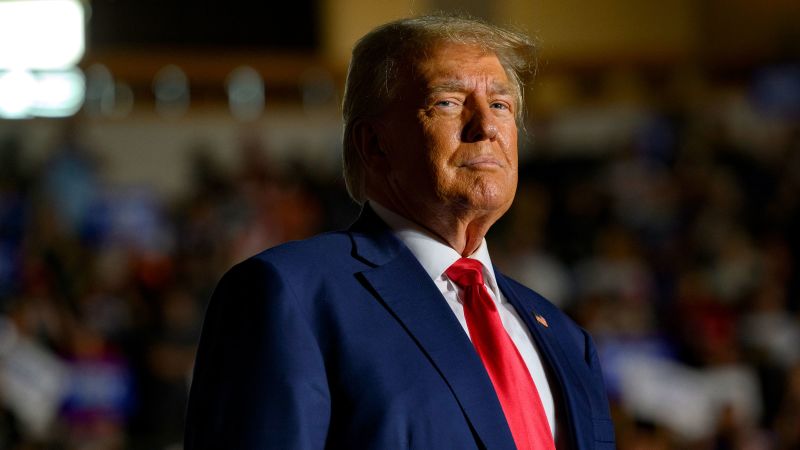Former President Donald Trump has been indicted on federal charges related to 2020 election subversion, marking the third time this year that he has faced criminal charges. Despite this, Trump could still become the President again if he wins the 2024 Republican presidential nomination. According to a leading expert on election law, there are very few requirements in the Constitution to serve as President, and being indicted, convicted, or even serving jail time does not disqualify someone from running for and winning the presidency. However, the question of whether a president can serve from prison remains unclear.
The newest criminal counts against Trump include conspiracy to defraud the United States, conspiracy to obstruct an official proceeding, obstruction of and attempt to obstruct an official proceeding, and conspiracy against rights. These charges are in addition to a separate federal indictment related to the mishandling of classified documents and felony criminal charges of falsifying business records in Manhattan.
If Trump were to be convicted before the 2024 election and still win, he could potentially grant himself a pardon. However, the Supreme Court may have to weigh in on whether he can do so. Trump could also appeal a conviction to the conservative Supreme Court.
Special counsel Jack Smith has expressed his intention to seek a speedy trial, but if Trump were to be elected before the trial concludes, he may be able to dismiss it entirely. Trump’s defense attorney, Robert Ray, has suggested that if Trump is reelected, he would have control over the Justice Department and could dismiss any pending cases against him.
In response to the latest indictment, Trump’s defense attorney John Lauro believes that a potential trial could last “nine months or a year.” Lauro emphasizes that his client deserves due process, just like any other American.
If Trump is convicted of a felony at the federal level or in New York, he would be barred from voting in his adoptive home state of Florida until he serves out a potential sentence.
The possibility of Trump assuming the Oval Office again despite facing criminal charges raises intriguing questions about the intersection of law and politics.
Is It Possible for Donald Trump to Serve as President if Convicted?
The question of whether Donald Trump can serve as President if convicted has been a topic of intense debate and speculation. As the former President of the United States, Trump has left an indelible mark on American politics, and his potential return to the highest office in the land has captured the attention of many. However, the legal implications surrounding a potential conviction raise important questions about the feasibility of such a scenario.
To begin with, it is crucial to understand the process of impeachment and conviction in the United States. The Constitution grants the House of Representatives the power to impeach a President for “high crimes and misdemeanors,” while the Senate has the authority to try and convict the President. If convicted, the Senate can then vote to disqualify the individual from holding any future office of honor, trust, or profit under the United States.
In the case of Donald Trump, he has already been impeached twice by the House of Representatives. The first impeachment, in 2019, resulted in an acquittal by the Senate. The second impeachment, in 2021, occurred after Trump had left office, making it the first time in American history that a former President was impeached. However, the Senate trial ended in another acquittal, leaving the question of conviction and disqualification unresolved.
While the Constitution does not explicitly address whether a convicted individual can serve as President, legal experts have offered differing interpretations. Some argue that disqualification is an inherent consequence of conviction, preventing the individual from holding any future office. Others contend that disqualification requires an additional vote by the Senate, even after conviction, to bar the individual from future office.
In the case of Donald Trump, if he were to be convicted in a future trial, the question of his eligibility to serve as President would likely be determined by the interpretation of the disqualification clause. If the prevailing interpretation is that disqualification is automatic upon conviction, Trump would be ineligible to serve as President. However, if the interpretation requires an additional vote by the Senate, the question becomes more complex.
It is worth noting that the Supreme Court has not directly addressed this issue, leaving room for uncertainty. The lack of a definitive ruling has allowed for differing opinions and interpretations to persist. Ultimately, the question of whether Donald Trump can serve as President if convicted may need to be resolved by the courts, should such a scenario arise.
In conclusion, the possibility of Donald Trump serving as President if convicted raises important legal questions. While the Constitution grants the Senate the power to convict and potentially disqualify an individual from holding future office, the interpretation of the disqualification clause remains a subject of debate. Whether disqualification is automatic upon conviction or requires an additional vote by the Senate is yet to be definitively determined. As such, the question of Trump’s eligibility to serve as President if convicted may ultimately be decided by the courts.








